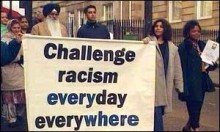Racism is a term that lacks agreement and causes controversy. It has multiple identities from emotional to institutional with ideological, cultural and colour blind hopping around looking for attention. Whether it is explained using psychology, sociology or biology they all point in the same direction i.e. anger, ignorance, scapegoating, disempowerment, oppression, violence (verbal or physical) and self loathing. Yes self loathing! If everything in our lives is in balance and we have sought to make sense of our world we do not pick on a stranger and slaughter them. We do not believe every negative hate filled story that does the rounds. We stand back and contemplate! We research and investigate! We seek reality over propaganda!
So racists are to be despised then? Categorically no! (Although the racists rushing to tweet @ messrs Ashley Cole and Young becuase they missed penalties and have the temerity to be black does push this sentiment somewhat). They are as much victims as those they bully and ridicule. Does anyone choose to be oppressed, ignorant and angry? Rarely, I suspect. It could be part of the human condition to distance oneself from strangers until we get to know more. A life preserving mechanism within our DNA. But even if this is the case we must surely be able to override this biological trait as many other people do. Is this down to our parents and peers? Are we attracted to those like us in ideas and beliefs and distance ourselves from those who are not? This takes us back a little too why some people are racist. If our parents, peers and other significant people in our lives are, for example, in agreement that immigrants are a threat to our national identity and they have not been taught to challenge these assumptions then they will stay static as we all do if we only reinforce existing ideas. But these attitudes are to be challenged if humanity is to have any self respect. This also goes for standing up to all types of prejudice and bigotry.
If we return to the topic of immigration (2011 census) there are many who are ambivalent and many who have strong feelings. Neither is wrong. However the key is to how and why we reach the attitudes that we have and then most importantly what effect do they have. Are solutions identified that can be negotiated? Will the long term future of the country or the community benefit from the outcome? Is the continuation of scapegoating… etc., healthy, not only for the wider population but also the individual? These, I consider, are the constituent parts that must be used to determine whether racism should be accepted or rejected. Let us take these questions and apply them to that omnipresent topic: immigration.
Are solutions identified that can be negotiated?
To identify a solution there must be a common agenda that both sides can agree upon. In other words the negotiation should be on going throughout the process not merely at the end. This benefits communication and reduces hostility. Where an agreement is required relates to the levels of migration occurring; what migration trends display; why immigration is perceived as problematic to some and what both sides of the discussion believe would be the best way forward. If hostility is minimised then negotiated discussion can persist.
Will the long term future of the country or the community benefit from the outcome?
This must be viewed across a broad section of the population and not left to those who actively voice their opinions. An anonymous process must take place amongst various other opportunities for debate. Alongside the above must be clear opportunities to discuss the impact of the solutions under consideration. Determining the outcomes of this question must include a dependence upon informed analysis with a deductive approach. An inductive approach is less appropriate until such time as a theoretical perspective obtains self realised consensus. In other words the measurement of what is beneficial must be ascertained from across the whole community before a theory is constructed to contextualise it. This enables those who contribute to at least be aware that being against immigration has to be justified with reliable and validated evidence not prejudice.
Is the continuation of scapegoating… etc., healthy, not only for the wider population but also the individual?
Throughout the process all individuals must attempt a self evaluation and ask themselves what value there is in blaming specific groups. Are they actually responsible or are they being scapegoated by others who are seeking to avoid responsibility and/or are looking to distract communities from the greater problems. By definition scapegoating transfers responsibility. Is this a healthy characteristic and if not what can be done to change it?
My own conclusions are that the maintenance of a rigid identity is misguided. All societies are dynamic in varying degrees. Change occurs as a result of humans being different to each other whatever their ethnic background, gender, sexuality or social class. Of course there are similarities too but change does not occur because of the similar it is because of those who are different but who also have the power to influence. Can you imagine what it would be like if we all affected change? The key to enabling only a small group is discussed at length in the video below and probably does more to shed light on why racism and all other other forms of prejudice are welcomed than any other. The approach described above and the questions that we must answer may also help us to overcome this very fear that creates such hostility. I do hope so!
Douglas James







